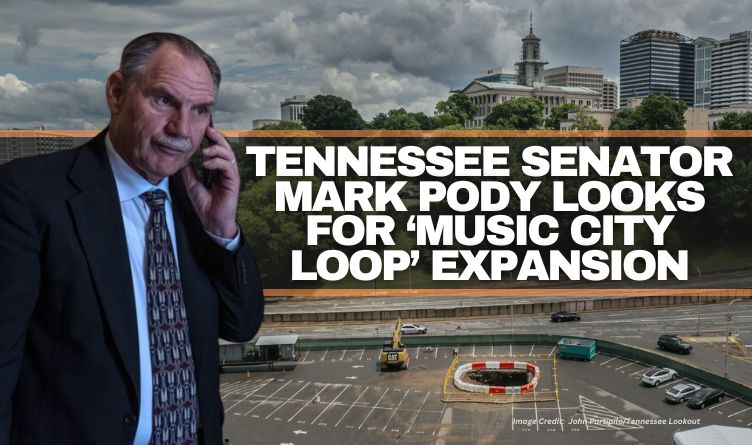Boring Company responds to litany of Nashville mayor’s office questions.
Image Credit: John Partipilo/Tennessee Lookout
By Sam Stockard [Tennessee Lookout -CC BY-NC-ND 4.0] –
Nashville’s Republican state senator says his initial concerns about the “Music City Loop” have been resolved, to the point he already wants to expand the proposed tunnel’s route to locations such as the East Bank and Music City Star depot in the Donelson area.
Sen. Mark Pody, a Lebanon Republican whose district takes in eastern Davidson County and Nashville International Airport, said he met with state agencies and Elon Musk’s Boring Company, which satisfied all of his questions as it prepares to dig a tunnel from downtown Nashville, just off Rosa Parks Boulevard near the Capitol, to the airport under Murfreesboro Road for a private transport operation.
“I’m fully on board with it, and I feel very comfortable with it, and think this is going to be a good thing for Tennessee,” Pody said.

Vice chairman of the Senate Transportation Committee, Pody said he wants to make sure the proposed tunnel doesn’t cause environmental or utility problems, but he’s also interested in Boring directing it to the Hermitage/Donelson area where parking is available for the Music City Star, a train that runs into downtown Nashville. He would like to see it extend, as well, to the East Bank where the state is involved with Metro Nashville in a massive development of the Titans stadium, Tennessee Performing Arts Center, Oracle headquarters and housing.
Besides responding to Pody, the Boring Company answered some 70 questions by Nashville Mayor Freddie O’Connell’s office, saying it would obtain Metro and state permits for the underground project and use backup emergency services measures for safety.
The loop, costing a few hundred million dollars in private funding, would use parallel tunnels to all locations so vehicles could travel in each direction, according to the responses. Any fees the company would pay to the state or Metro remain under negotiations.
The mayor’s office is reviewing the responses and expects to follow up with the Boring Company to get a better understanding of the potential impact on Nashville residents, according to spokesperson Julie Oaks Smith.
Despite the company’s assurances and Pody’s acceptance, Democratic Sen. Heidi Campbell of Nashville continues to oppose the plan, calling the process “outrageous” and saying no impact study has been completed in advance of the work.
Regardless of whether the project turns out to be good for the area, the state hasn’t considered the views of Nashville residents, she said.
The State Building Commission Executive Subcommittee held a public hearing more than a month ago, taking comments from the public, but held little discussion before approving a no-cost lease of a state-owned parking lot near the Capitol for Boring to launch its tunnel-digging equipment.
“It’s indicative of a larger trend nationally with the government we’re seeing that disregards the democratic process, and that to me is one of the most alarming parts of it,” Campbell said.
The project also provides one more example of the state government favoring large corporations over public interests, Campbell said.
The state of Tennessee plans to sign a long-term lease with Boring for occupancy and operations on state right of way that would go through the state’s excess land process, which requires approval by the Federal Highway Administration, according to Department of Transportation spokesperson Beth Emmons.
The Boring Company has announced its plan to apply for a permit with the Department of Transportation, which has to be reviewed to determine whether the permit is applicable, Emmons said. The state tailors permits based on each project.
“This being a first-of-its-kind project, we expect this request would result in an enhanced grading permit to address the large scope of work and that may require additional information and requirements of the permittee to ensure all state interests are maintained throughout construction,” Emmons said.

Responding to Metro
The Boring Company last week sent O’Connell’s office responses to a multitude of questions.
- For emergency vehicle access during and after construction, Nashville tunnels will be designed to meet national transit standards that require exit spacing up to 2,500 feet. Emergency vehicles would access the same portals as Tesla vehicles used in the loop.
- Music City Loop would comply with authorities that have jurisdiction over life safety. The company met with the State Fire Marshal’s Office and Nashville Fire Department and invited them to visit the Vegas Loop to see life safety systems at work.
- Tunnels would have “redundant” communication systems for 911 calls and responders, enabling coordination between emergency services workers and dispatchers above ground, all meeting national requirements. Passengers and responders could make 911 calls four ways: at blue light stations, directly from cell phones, through vehicles or by an operations control center.
- Tunnels will have space for passengers and employees to get in and out of vehicles in an emergency. Vegas Loop tunnels have nearly 3 feet between the vehicle’s side mirror and wall.
- In case of a vehicle battery fire — Tesla reports 232 confirmed battery fires — a ventilation system will send smoke and hazardous gases toward outlets.
- To keep people out of the tunnel, access points would have secure gates, controlled station entrances and camera coverage without blind spots. In case a person entered without permission, an operations control center or automated systems would alert security and trigger a red tunnel light prompting drivers to stop until the person is removed.
- Similarly to the Vegas Loop, Music City Loop tunnels would be watertight using gaskets to seal joints and a 3-inch layer of grout sealant outside the tunnel. If water gets into the system, high-power sump pumps would force it out.
- Music City Loop insurance would meet and exceed requirements specified in permits and state law, and the company would be responsible for injuries caused by its operations.
- Long-term ownership of the tunnel is being reviewed and is to be released to the public when final.
- Maintenance and upkeep is to be privately funded and subject to terms of the state lease agreement.
- The project is undergoing utility review to avoid conflicts. Music City Loop will pay for relocating utilities and adhere to permitting processes.



